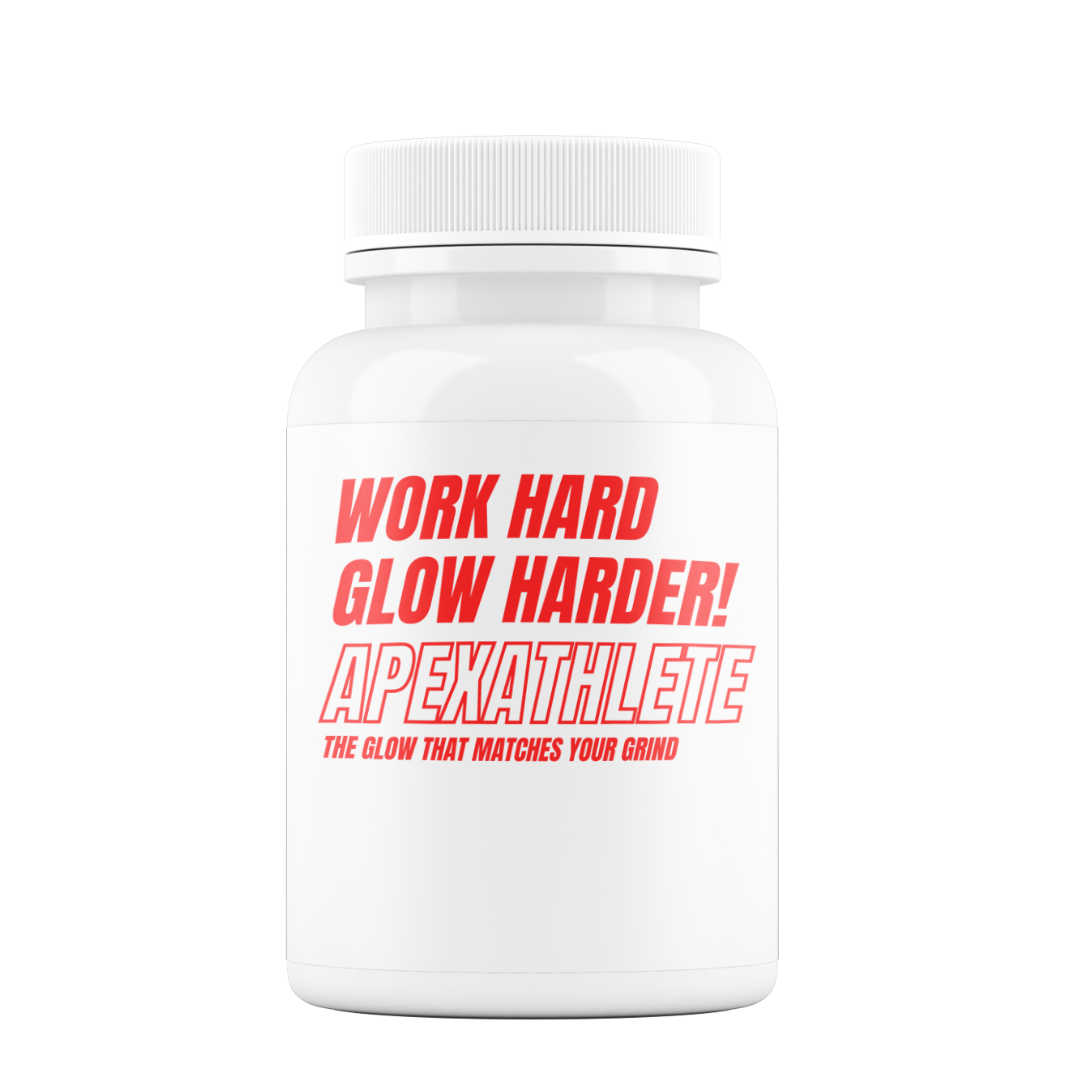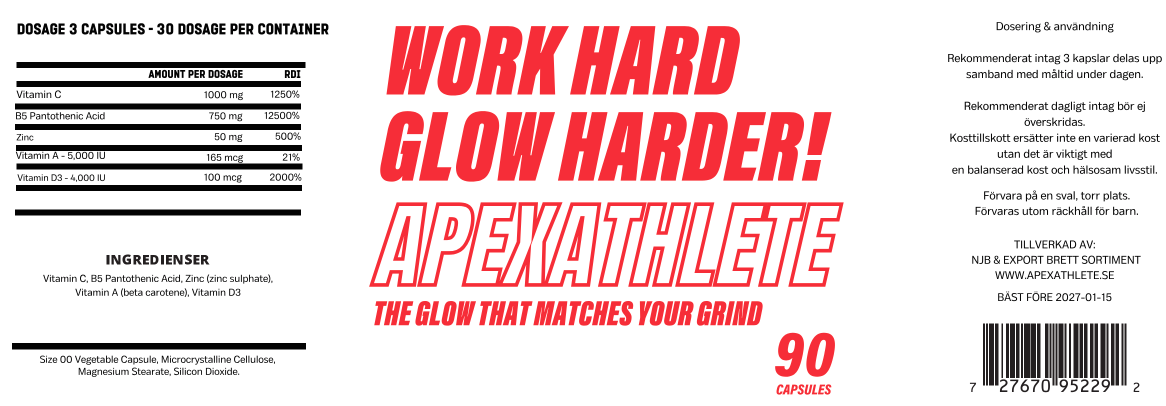Vitamin C
1. Boosts Collagen Production
-
Vitamin C is essential for the synthesis of collagen, the protein that keeps skin firm, plump, and youthful.
-
As we age, collagen levels decline — vitamin C helps slow that process and can reduce the appearance of fine lines and wrinkles.
2. Powerful Antioxidant Protection
-
Neutralizes free radicals caused by sun exposure, pollution, and stress — which contribute to premature aging.
-
Helps prevent oxidative stress, a major factor in skin aging and dullness.
3. Reduces Hyperpigmentation
4. Speeds Up Skin Repair
-
Aids in healing acne scars, wounds, and inflammation.
-
Essential for tissue growth and repair, which can help skin look smoother and healthier.
5. Hydration and Barrier Support
-
Improves skin barrier function, helping skin retain moisture.
-
Can reduce dryness and support a dewy, supple appearance.
is an Essential Water-Soluble Vitamin with Potent Anti-Oxidant Properties as it draws Free Radicals from the Body. Vitamin C’s Chemical Structure Provides Minor Neuro-Protective Effects, Interacts with the Pancreas & Modulates Cortisol Levels.
In case of the Ketogenic Diet, Vitamin C is used as a Non-Metabolic Place Holder for Carbohydrates. Although Carb Intake is usually still around 30-50g per Day, these Carbs come from Vegetables and/or Nuts, which due to their relatively High Fiber Content as well as low Glycemic Index, appear not to Stimulate the Pathways that Starchy Carbohydrates from Rice, Oatmeal or Potato undertake in the Body. Vitamin C however, does undergo the same Pathways, but it not Bio-Available for Energy Production and Potentiates an Anti-Oxidant Effect instead. As Vitamin C is Structurally very Similar to Glucose (Simple Carbohydrates), it’s Transported through Similar Metabolic Pathways as Regular Glucose.
Processes stay Optimized and Active, even when Carbohydrates are (Severely) Restricted. This makes the Carb-Loading or Refeed Process for 1 or 2 Days per Week, much more Efficient and leads to less Water Retention during the Refeed, as well as the Day after the Refeed with a Surplus of Carbohydrates.
Vitamin C also has Minor Diuretic Effects, since Sodium Intake is usually increased while following a Ketogenic Diet to maintain Muscular Fullness & Hydration. The excess of Sodium is excreted alongside Vitamin C, resulting in Less Sub-Cutaneous (SubQ) Water Retention throughout the Day, without any loss of Muscle Fullness or Performance.
Vitamin B5 (Pantothenic Acid)
1. Reduces Acne and Breakouts
-
One of the most researched benefits.
-
B5 helps regulate sebum (oil) production, reducing clogged pores and acne.
-
A 2014 clinical trial found significant reductions in acne lesions after 12 weeks of B5 supplementation (2.2 g/day).
Study: Yang & Jung et al., 2014
2. Supports Skin Barrier Function
-
Enhances the epidermal barrier, improving skin resilience against irritants and dehydration.
-
Promotes wound healing and recovery from irritation, redness, and minor damage.
3. Improves Skin Hydration
-
Helps maintain skin moisture by supporting lipid production.
-
May alleviate dry, flaky skin, making it smoother and more supple.
4. Anti-Inflammatory Effects
-
Reduces inflammation in the skin, which is beneficial in acne-prone and sensitive skin.
-
May calm redness and support healing of inflamed blemishes.
5. Enhances Overall Skin Health
-
Supports coenzyme A synthesis, which is crucial for skin metabolism and cell regeneration.
-
Helps in the metabolism of fats and proteins, indirectly supporting healthier skin structure.
-
• Pantothenic Acid (Vitamin B5); Aids in the Creation of New Coenzymes, Proteins & Fats, while Red Blood Cells utilize Pantothenic Acid for internal Energy Producion & Metabolism.
Zinc
1. Fights Acne
-
Zinc helps reduce oil (sebum) production, which prevents clogged pores.
-
It has antibacterial and anti-inflammatory properties, making it effective against Cutibacterium acnes (the bacteria linked to acne).
-
Clinical studies show that zinc supplementation (30–120 mg/day) can significantly reduce acne severity, especially in mild to moderate cases.
2. Supports Wound Healing
-
Zinc is essential for collagen synthesis and cell regeneration.
-
Speeds up healing of cuts, acne lesions, and skin irritation.
-
Often used in hospitals to treat pressure ulcers, burns, and skin injuries.
3. Reduces Inflammation
-
Zinc suppresses inflammatory cytokines in the body.
-
This helps reduce skin redness, swelling, and irritation—important in conditions like acne, rosacea, and eczema.
4. Boosts Immune Defense in the Skin
-
Strengthens the skin’s ability to fight off infections and bacteria.
-
Zinc deficiency can lead to slower healing, more breakouts, and weakened barrier function.
5. Acts as an Antioxidant
-
Protects skin from oxidative damage caused by UV rays, pollution, and aging.
-
Helps maintain healthy skin cells and slow down signs of premature aging.
🛡️ 1. Boosts Immune Function
-
Zinc is essential for immune cell activity and fighting off viruses and bacteria.
-
Deficiency can lead to more frequent colds, infections, and slower healing.
-
Zinc lozenges are often used to shorten cold duration.
🧠 2. Supports Brain and Mental Health
-
Helps regulate neurotransmitters like dopamine and serotonin.
-
Low zinc levels have been linked to depression, anxiety, and ADHD.
-
Important for cognitive function, memory, and learning.
🧬 3. Essential for Growth and Development
-
Critical during childhood, adolescence, pregnancy, and healing processes.
-
Supports cell division, DNA synthesis, and proper reproductive health.
🍽️ 4. Supports Metabolism and Digestion
-
Zinc is involved in:
-
Carbohydrate and protein metabolism
-
Enzyme production for digestion
-
Maintaining appetite and taste perception
👁️ 5. Improves Eye Health
-
High levels are found in the retina.
-
Plays a role in preventing age-related macular degeneration (AMD).
-
Often included in AREDS supplements for vision support.
🧑⚕️ 6. Supports Hormone Balance and Fertility
-
In men: Helps maintain testosterone levels, sperm health, and libido.
-
In women: Supports egg health and hormone balance.
-
Zinc is also important for thyroid hormone function.
🧴 7. Promotes Hair and Nail Strength
-
Zinc deficiency can cause hair thinning, brittle nails, and delayed hair growth.
-
Often used in supplements for hair loss and breakage prevention.
Vitamin A
1. Reduces Acne
-
Regulates sebum (oil) production in the skin.
-
Promotes normal skin cell turnover to prevent clogged pores.
-
High-dose retinoid medications like isotretinoin (Accutane) are prescription-strength vitamin A derivatives for severe acne.
2. Improves Skin Texture and Tone
-
Helps reduce roughness, fine lines, and uneven pigmentation.
-
Encourages faster skin regeneration, leading to smoother, brighter skin over time.
3. Supports Skin Cell Renewal
👁️ 1. Supports Vision
-
Critical for night vision and overall eye health.
-
Vitamin A is part of rhodopsin, a pigment in the retina that helps you see in low light.
-
Deficiency can lead to night blindness and, in severe cases, complete vision loss.
🛡️ 2. Boosts Immune Function
-
Strengthens mucous barriers in the eyes, lungs, gut, and skin — your body’s first line of defense.
-
Enhances the activity of white blood cells, helping fight infections.
-
Deficiency increases risk of respiratory infections and slower healing.
👶 3. Supports Growth and Reproduction
-
Essential for fetal development and the health of reproductive organs in both men and women.
-
Involved in sperm production and placental function.
-
Important during pregnancy — but too much preformed vitamin A can be harmful to the fetus.
🧠 4. Cellular Growth & Differentiation
-
Regulates gene expression and cell turnover.
-
Helps your body produce new, healthy epithelial cells — the cells that line your skin, organs, and blood vessels.
-
This is why it's essential for skin repair, organ function, and cancer prevention.
🦴 5. Bone Health
-
Helps in bone remodeling alongside vitamin D and K.
-
But — too much vitamin A (especially >3,000 mcg/day) can weaken bones, so balance is key.
🍽️ 6. Antioxidant Function (Beta-Carotene Form)
-
Beta-carotene, a plant-based form of vitamin A, acts as an antioxidant.
-
Helps protect cells from oxidative stress, which contributes to aging and chronic disease.
4. Powerful Antioxidant Protection
5. Promotes Wound Healing
Vitamin D3
1. Reduces Inflammation
2. Boosts Skin Barrier Function
-
Helps your skin form and maintain a strong, protective barrier, keeping out irritants and locking in moisture.
-
A healthy barrier = fewer breakouts, dryness, and irritation.
3. Helps Manage Skin Conditions
4. Supports Wound Healing
5. Protects Against Premature Aging
6. Balances Skin Tone and Pigmentation
🦴 1. Strengthens Bones and Teeth
-
Primary role: Helps your body absorb calcium and phosphorus, which are critical for bone formation.
-
Prevents rickets in children and osteoporosis in adults.
-
Deficiency causes bone pain, fractures, and poor tooth health.
🛡️ 2. Boosts Immune System
-
Activates T-cells and macrophages, which help detect and destroy viruses and bacteria.
-
Supports defense against respiratory infections, including colds and flu.
-
Some research links higher D3 levels with reduced severity of COVID-19 infections.
🧠 3. Supports Mood and Brain Function
-
Linked to reduced risk of depression — D3 may affect serotonin and dopamine levels.
-
Deficiency is common in people with seasonal affective disorder (SAD).
-
Supports memory, cognitive clarity, and neurological protection.
🩺 4. Helps Regulate Hormones
-
Involved in insulin production, supporting better blood sugar control.
-
May help reduce risk of type 2 diabetes, especially in people with insulin resistance.
-
Plays a role in thyroid and sex hormone balance.
❤️ 5. Protects Heart Health
⚖️ 6. Supports Healthy Weight and Muscle Strength
-
Low vitamin D is linked to increased body fat and difficulty losing weight.
-
Plays a role in muscle strength and coordination, especially in older adults.
👶 7. Crucial for Pregnancy and Fertility
-
Helps support fetal bone and immune development.
-
Important for female fertility and may improve outcomes in IVF.
-
Deficiency increases risks of gestational diabetes, preeclampsia, and low birth weight.













